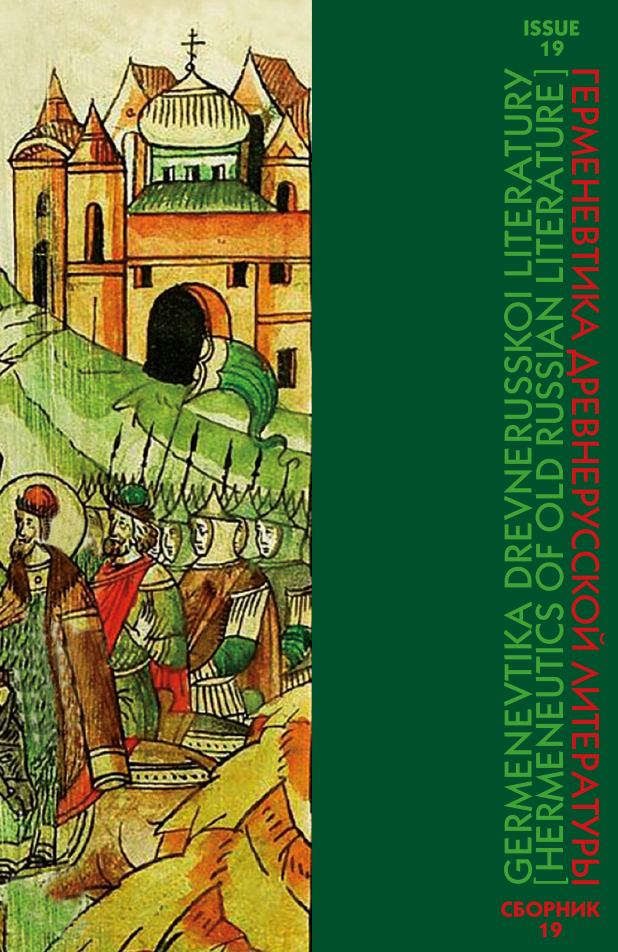Abstract: The article discusses the reasons why Yaroslavna, in her lament, grieves for her husband, Prince Igor Svyatoslavich, but does not even mention her son Vladimir, who was also captured by the Polovtsy. It is proved that the lack of mention about Vladimir cannot be explained by real reasons and does not have psychological motivation. It is shown that this peculiarity of Yaroslavna’s lament is explained by the mythopoetic nature of the The Tale about Igor’s Campaign. Igor’s defeat and captivity in the fairy-tale code of The Tale is depicted as a happy return from the realm of death, like a resurrection. Vladimir Igorevich, partly equivalent to the father in the plot of the “song”, after Igor escaping from captivity, confusing Konchak and abducting the bride from the “kingdom of death”, is not the protagonist of the Word, The doubling of the central character is impossible in the plot of the fairy tale, and Vladimir Igorevich is given a marginal role. Therefore, his mother Yaroslavna does not mourn him.
References:
1 Gasparov B.M. Poetika “Slova o polku Igoreve” [Poetics of The Tale of Igor’s Campaign]. Moscow, Agraf Publ., 2000. 608 p. (In Russian)
2 Gorskii A.A. “Vsego esi ispolnena zemlia Russkaia…”: Lichnosti i mental’nost’ russkogo srednevekov’ia: Ocherki [“Russian land is full of all...”: Personalities and mentality of the Russian Middle Ages: Essays]. Moscow, Iazyki slavianskoi kul’tury Publ., 2001. 176 p. (In Russian)
3 Demkova N.S. Problemy izucheniia “Slova o polku Igoreve” [Problems of studying the The Tale of Igor’s Campaign]. Demkova N.S. Srednevekovaia russkaia literatura: Poetika, interpretatsii, istochniki: Sbornik statei [Medieval Russian literature: Poetics, interpretations, sources: Collection of articles]. St. Petersburg, Izdatel’stvo Sankt-Peterburgskogo universiteta Publ., 1997, pp. 33–76. (In Russian)
4 Ipat’evskaia letopis’ [The Ipatiev chronicle]. Polnoe sobranie russkikh letopisei [Complete collection of Russian chronicles]. Moscow, Iazyki russkoi kul’tury Publ., 1998. Vol. 2. 648 p. (In Russian)
5 Iroicheskaia pesn’ o pokhode na Polovtsov udel’nogo kniazia Novagoroda-Severskogo Igoria Sviatoslavicha [The heroic song about the campaign of appanage Novgorod-Seversky prince Igor Svyatoslavich against the Polovtsians <…>]. Moscow, V Senatskoi tipografii Publ., 1800. VIII+46 p. (In Russian)
6 Kagan M.D. Iaroslavna [Yaroslavna]. Entsiklopediia “Slova o polku Igoreve”: v 5 t. [Encyclopedia of The Tale of Igor’s Campaign: in 5 vols.]. St. Petersburg, Dmitrii Bulanin Publ., 1995, vol. 5, pp. 295–297. (In Russian)
7 Kempbell Dzh. Tysiachelikii geroi [The Hero with a Thousand Faces], transl. from English by O.Iu. Chekchurina. St. Petersburg, Piter Publ., 2018. 352 p. (In Russian)
8 Lavrent’evskaia letopis’ [Laurentian chronicle]. Polnoe sobranie russkikh letopisei [Complete collection of Russian chronicles]. Moscow, Iazyki russkoi kul’tury Publ., 1997. Vol. 1. 496 p. (In Russian)
9 Propp V.Ia. Morfologiia skazki [The Morphology of Fairy Tale]. 2nd ed. Moscow, Glavnaia redaktsiia vostochnoi literatury izdatel’stva “Nauka” Publ., 1969. 168 p. (In Russian)
10 Ranchin A. Obrazy Igoria i Konchaka v “Slove o polku Igoreve”: struktura teksta i istoricheskie fakty [Images of Igor’ and Konchak in The Tale of Igor’s Campaign]. Rossiia XXI, 2019, no 2, pp. 110–127. (In Russian)
11 Slovo o polku Igoreve [The Tale of Igor’s Campaign]. Leningrad, Sovetskii pisatel’ Publ., 1952. 488 p. (In Russian)
12 Sokolova L.V. Motiv zhivoi i mertvoi vody v “Slove o polku Igoreve” [The motif of living and dead water in The Tale of Igor’s Campaign]. Trudu Otdela drevnerusskoi literatury [Works of the Department of Old Russian literature]. St. Petersburg, Dmitrii Bulanin Publ., 1993, vol. 48, pp. 39–47. (In Russian)
13 Solov’ev A.V. Vosem’ zametok o “Slove o polku Igoreve” [Eight Notes about The Tale of Igor’s Campaign] Trudu Otdela drevnerusskoi literatury [Works of the Department of Old Russian literature]. Moscow, Leningrad, Nauka Publ., 1964, vol. 20, pp. 365–385. (In Russian)
14 Istoriia Rossiiskaia s samykh drevneishikh vremen sobrannaia i opisannaia Vasil’em Nikitichem Tatishchevym [The History of Russia since oldest times collected and described by Vasily Nikitich Tatishchev]. Moscow, Imperatorskii Moskovskii universitet Publ., 1774. Vol. 3. 530 p. (In Russian)
15 Tvorogov O.V. Na kom byli zhenaty Igor’ i Vsevolod Sviatoslavichi? [Who Igor’ and Vsevolod Svyatoslavich were married?] Trudu Otdela drevnerusskoi literatury [Works of the Department of Old Russian literature]. St. Petersburg, Dmitrii Bulanin Publ., 1993, vol. 46, pp. 48–51. (In Russian)






